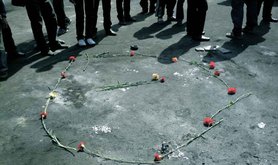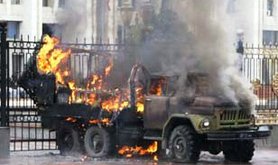The land seizures in Bishkek, Kyrgyzstan before and after the 7 April 2010 uprising have been portrayed in the mass media as having been perpetrated by criminals and an ignorant rural class. In fact, they are a response to the uneven development of private property, a problem that goes back to the neo-liberal agricultural reforms and urban slums. This reflects a trend throughout the developing world. According to the 2003 United Nations-Habitat report, The Challenge of Slums, 32% of the world’s urban population live in slums, most of them in the developing world. Urbanisation, so often associated with modernity and a politics of hope, all too often now involves a Hobbesian struggle for survival.
In Bishkek, illegal settlements are euphemistically called novostroyki (new constructions). There are over 300,000 people living in 28 slum settlements on the outskirts of the city, each settlement has its own name: ‘Ak-Jar’, ‘Ak-Bata’, ‘Kelechek’, ‘Nijnyaya Ala-Archa’ and so on. Many of the illegal settlements were established in the late 1990s and early 2000s, and they grew after the 2005 ‘Tulip’ Revolution. While some commentators note that the latest land seizures repeat past waves of land grabbing in the capital, land invasions, looting and communal riots are common occurrences in developing countries which have faced structural adjustment packages, urban slums and consumption crises.
The International Monetary Fund, World Bank and World Trade Organisation have imposed upon Kyrgyzstan and many other developing countries a package of neo-liberal economic policies. Powerless to resist, governments have had to sign up to these structural adjustment programmes in return for international loans, foreign direct investment and other financial support. Since independence in 1991, Kyrgyzstan has undergone an extensive programme of liberal marketisation and privatisation: privatisation of land and property, a break-up of kolkhozes, reductions in subsidies and import tariffs, liberalisation of commodity prices, cuts in state expenditure, relaxation of foreign ownership rules in key sectors (such as gold mines), opening up of home markets to imports, floating the exchange rate and so on. The shock therapy approach to the ‘transition’ to a market economy has had negative consequences on the Kyrgyzstani agricultural sector, and indirectly on urban slums and land invasions.
Given the small allocation of land that each family received in the 1990s in South Kyrgyzstan, most farmers struggle to eke a living, and are unable to absorb family labour, resulting in rural unemployment and underemployment. In addition, marginal and small farmers lack funds to buy adequate fertilisers, to invest into a proper irrigation system, to pay for effective livestock immunisation, or to capitalise their farms for future growth. Many farmers survive by pooling their resources, reviving some aspects of the Soviet kolkhozes. Some have abandoned farming, either by leasing their land rights to larger farmers, who possess the capital to undertake successful commercial farming, or by giving back their tenancy rights to ayil okomotu (local state administration), who then lease them to rich farmers. As a result, the rural society has become pauperised.
Much of rural surplus labour has migrated to Bishkek, Osh or abroad, acting as a social safety valve. According to some estimates there are over 300,000 Kyrgyzstani migrants in Russia, and over 150,000 in Kazakhstan. In comparison to internal migration to Bishkek and Osh, external migration is more lucrative, but also more costly and dangerous. Developed countries may allow capital to move across national boundaries, but the West is a fortress to unskilled labour coming from ‘black’ countries.
Bishkek has become a dumping ground for the displaced rural surplus labour. Slum dwellers face two problems: accommodation and employment. As there is an inadequate supply of social housing and new private housing only caters for the new middle class, many urbanised rural poor people have no choice but to rent small, poorly furnished rooms from slum landlords, struggling to pay exorbitant rent and often getting evicted. Some propertyless people may decide to construct their own home by grabbing plots of land on the outskirts of the city, preferably near their place of work. But as land becomes harder to acquire, some land grabbers (zakhvatchiki) are forced to build houses near hazardous areas, such as anthrax infected sites and gas pipes. Slum dwellers also face a threat of ecological and health disasters, such as water-borne diseases because of lack of sanitation. A report for the World Bank in 2007 notes that the whole city is vulnerable to an infectious health disaster should its groundwater become contaminated.
Slum development tends to expand the informal sector and the bazaar economy. Many propertyless and poor people enter businesses and occupations with low barriers of entry, resulting in intense rivalry and lower income for all. They are often involved in labour-intensive and low-income generating activities, such as street-vending, construction, bazaars, cleaning and semi-skilled self-employment. In order to save time and money, many internal migrants desire to live near their place of work, such as ‘Dordoi’ Market. Lacking economic capital, social networks and know-how, propertyless and poor individuals cannot hope for entrepreneurial or occupational success, but rather focus on household economic survival. Successful economic practices depend upon super self-exploitation, unpaid family labour, kinship support, fierce competition, personal patronage, bribes, ethnic exclusion and clan loyalties. The informal poor class live in a Darwinian world of intense rivalry, survival niches, exploitative behaviour, corruption and nepotism. There is little goodwill, cooperation or social capital amongst the poor, as the exploited exploit the exploited. Thus, the country’s reliance on the World Bank's poverty-reduction strategies drawing upon urban community development, micro-finance lending and self-help organisations is woefully inadequate.
Urban Involution
Slums dwellers live in over-crowded, unhealthy and scanty conditions. They lack residence permits (propiskas), so that their access to education, health care and social benefits is limited. Without propiskas, they also cannot vote in Bishkek. Socially and politically disfranchised, they lack real power to make meaningful changes to their lives. They are sensitive to price and income changes, and are acutely conscious of life necessities. Rumours, jokes and stories circulate about the former president’s son, Maksim Bakiyev, who pillaged the country by privatising strategic companies, making secret deals over the US military base at Manas, and hiking up mobile call charges. In the run up to the 7 April uprising, they learnt even more from the Russian media.
During the consumption crisis in 2009 and early 2010, poor people became more fearful about their ability to make ends meet. Immigrants’ remittances, started to decline as the Russian economy slowed down. Utility prices were hiked up at the start of 2010. Then on 1 April, Russia announced a sharp increase in fuel prices to Kyrgyzstan, causing many people to fear further economic hardship and greater strained relationship with the country’s major economic partner.
Up until 7 April, communal violence had been contained by the police and security forces, but when Bakiyev was overthrown in the afternoon, violence exploded in a celebratory and riotous way. Urbanised rural poor began to pursue immediate goals, such as land invasions in search of accommodation and looting shopping malls and shops. This was neither a class revolt nor a demand for greater democracy, but rather an opportunity to make their daily life bearable.
The politics of the informal poor class is not shaped by revolutionary or ideological ideals. Survival needs constitute their politics. They endorse populist leaders: Bakiyev and Kulov in 2005, now Otunbayeva, Tekebayev and Sariev, and should they fail to deliver immediate relief, other populist leaders will take their place.
Communal violence and mob crowds are a manifestation of complex social structures, including class and ethnicity, and it is difficult to attribute causality to only one factor. On 19 April, large groups of ethnic Kyrgyzs attempted to seize plots of land belonging to a Turkic minority group in the village Mayevka, on the outskirts of Bishkek. Some shouted ‘Kyrgyz land for the Kyrgyzs!’ Driven by competitive survival instincts for scarce land, poor Kyrgyz slum dwellers ignored government and communal appeals for national unity and ethnic tolerance in search of easy land grabbing. Other easy targets, such as Bakiyev’s family homes, were also looted and occupied. Taking the route of least resistance, crowds did not target rich segregated communities, partly because armed private security guards deterred them. There appears to be no real evidence that elites and local populist leaders directed mob crowds against specific ethnic groups, or that they were fuelled by racial hatred and nationalism, unlike the recent ethnic clashes in Osh and Jalal-Abad.
The leaders of the interim government seek to frame looting and land invasions in terms of law and order, rather than as a manifestation of social inequalities. They assure international and local business leaders that there will be no re-distribution of land, and have issued decrees protecting private property and outlawing land invasions. Although officials have sometimes been forced to meet the demands of the propiska-less and propertyless classes after days of public demonstrations, on current evidence there is nothing to suggest that the interim government aspires to transform society into a fairer one.
In conclusion, the post-Soviet Kyrgyzstani state has been unable to provide real assistance and support to the urbanised rural and poor classes constrained as they have been by the neo-liberal orthodoxy of the international donor community. There are insufficient social provisions or public works programmes to meet the needs of the poor.
Slum developments and the rural displacement of labour partly explain land seizures, looting and communal violence. But land invaders are also moved by anger and frustration, reflecting their understanding of corruption, inequalities and injustices in society. They articulate moral rights due to all citizens, irrespective to class and status.
Dr Balihar Sanghera is a lecturer in sociology and director of social sciences at Britain’s University of Kent
Read more
Get our weekly email



Comments
We encourage anyone to comment, please consult the oD commenting guidelines if you have any questions.